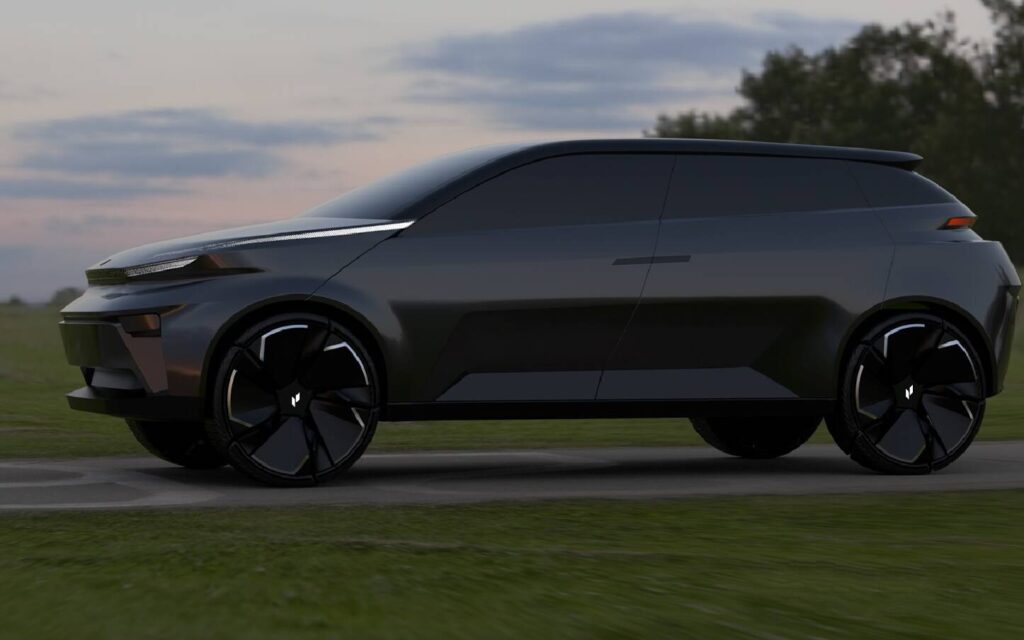Automotive Elements Producers’ Association of Canada (APMA), which announced its intention to build a brand-new electrical vehicle three years ago, has shown a fully functional concept version of its Mission Arrow EV. According to APMA CEO Flavio Volpe, Mission Arrow was developed to highlight the skills and technologies offered by Canadian suppliers. It was introduced in concept form at CES 2023 on schedule, under budget, and with 97 percent domestic content.
The EV Arrow
Four students from Carleton University in the department of Industrial Design created the car, which was then constructed at Ontario Technical University’s automotive engineering facility. It is claimed to be 97% Canadian-made and was constructed utilizing supplies from roughly 60 different sources. Fun fact: The concept car’s composite chassis was created using 3D technology
The 82.5-kWh battery pack that powers the Project Arrows EV Concept, which is built on a mid-size SUV chassis and has a range of more than 480 km, is assisted by a solar panel on the roof. Dual-motor power with a combined output of 550 horsepower and 472 lb-ft is installed in the car. There aren’t many details readily available about the electric crossover, but its engine is an 82.5-kWh lithium polymer battery that can go around 300 miles (500 kilometers), in part with the aid of the rooftop solar panel.
The Projects Arrow EV Concept’s appearance is distinguished by a low, broad stance and a swooping roofline. A handful of aerodynamic components are also visible, including a rear spoiler and active grille shutters. The Project Arrows EV Concept’s interior is created with a clear, simple look in mind, as well as plenty of room. It has a 12.3-inch touchscreen infotainment system and a digital instrument cluster.
A comfortable and relaxed atmosphere is promoted through the use of ambient lighting and lightweight, breathable seating. Advanced safety technologies including lane departure warning, frontal collision warning, and the automated emergency braking are also included in the Project Arrow EV Concept. With a combined output of 550 horsepower, the battery drives two electric motors, one on each axle for all-wheel drive capabilities. The Missions Arrow EV can go from 0 to 60 miles per hour (100 km/h) in three seconds thanks to this configuration. Additionally, APMA discussed cybersecurity technology, a smart cockpit, and degree 3 autonomy for EVs.
The association does not currently have any intentions to build another prototype and it will not place the current one through crash testing. You should know that the crossover was designed using commercially available components that might be incorporated amount on a meeting line to comply with Canada’s security standards for street legality. APMA doesn’t currently have any plans to start producing the Mission Arrow. The vehicle serves as a showcase for Canadian suppliers of parts who want to market genuine parts to OEMs.
Mission Arrow’s composite chassis was 3D-printed by Xaba, a Toronto-based firm in software, engineering, and robotics. Xaba’s Clever Machines 3D-printed the whole chassis using specially designed materials from Dartmouth-based Meta Supplies. The Mission Arrow EV concept will make appearances this year in the Detroit, L Angeles, Canada, and Montreal auto shows as well as several OEMs to demonstrate its technology after making its global premiere at CES 2023.
Conclusion
The APMA Projects Arrow EV Concept’s actual objectives are therefore twofold: to highlight the prospects of electric cars in Canada and the skills of Canadian car companies. The initiative hopes to pave the way for Canada to become a global leader in the field of electric vehicles in the long term. Of course, Canada isn’t the only nation attempting to take this stance. In this aspect, time will divide the victors from the losers.
